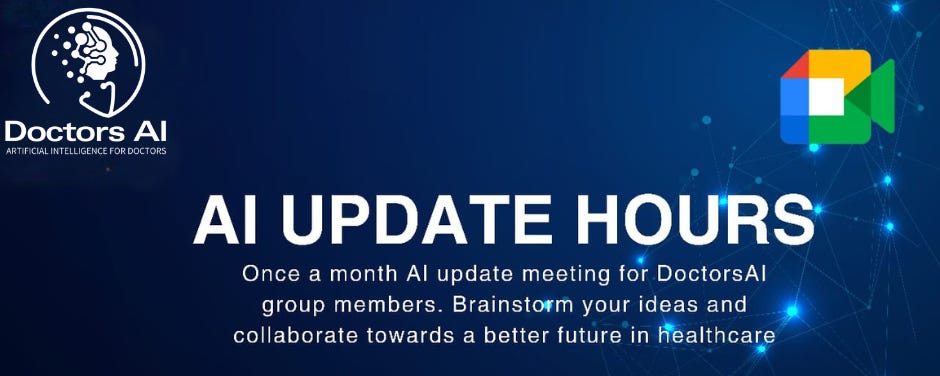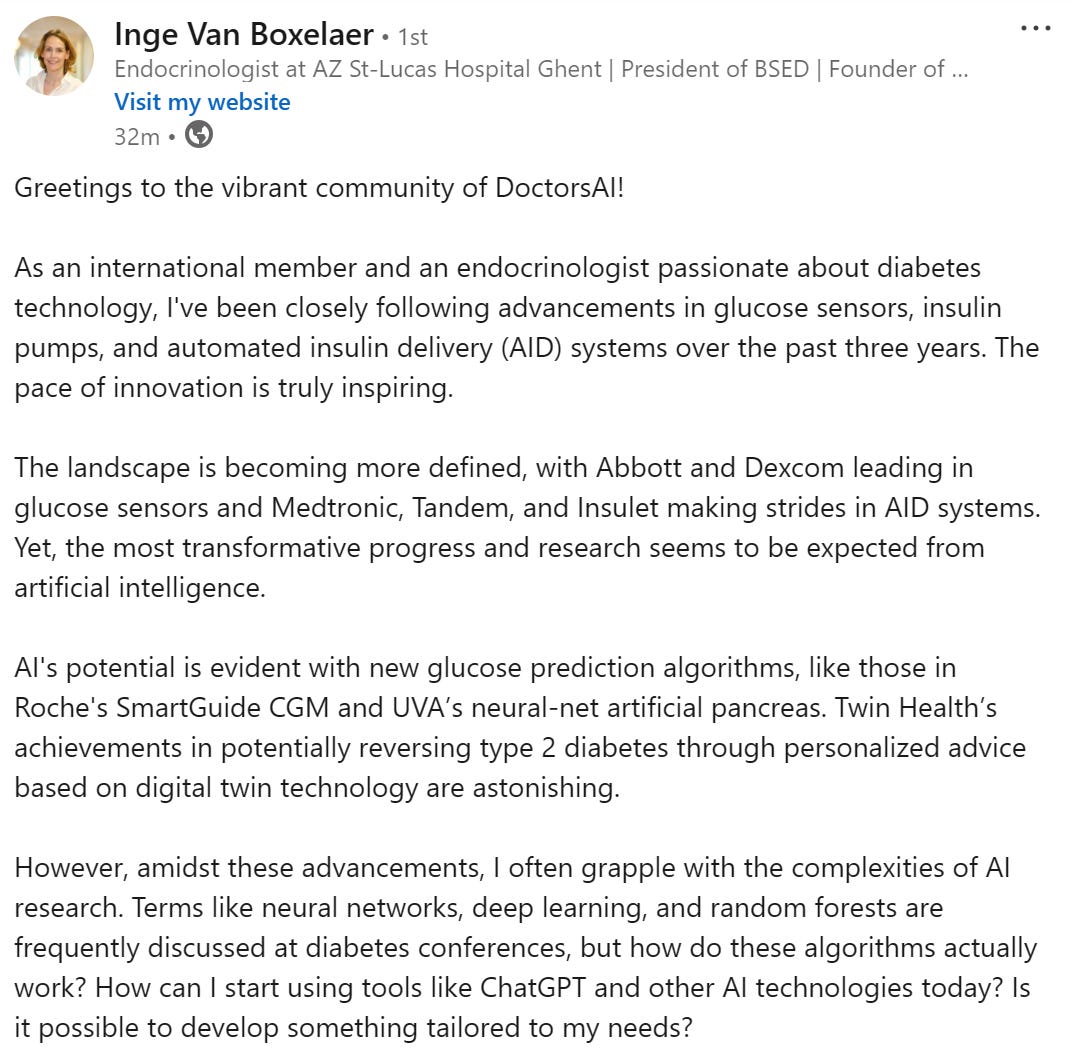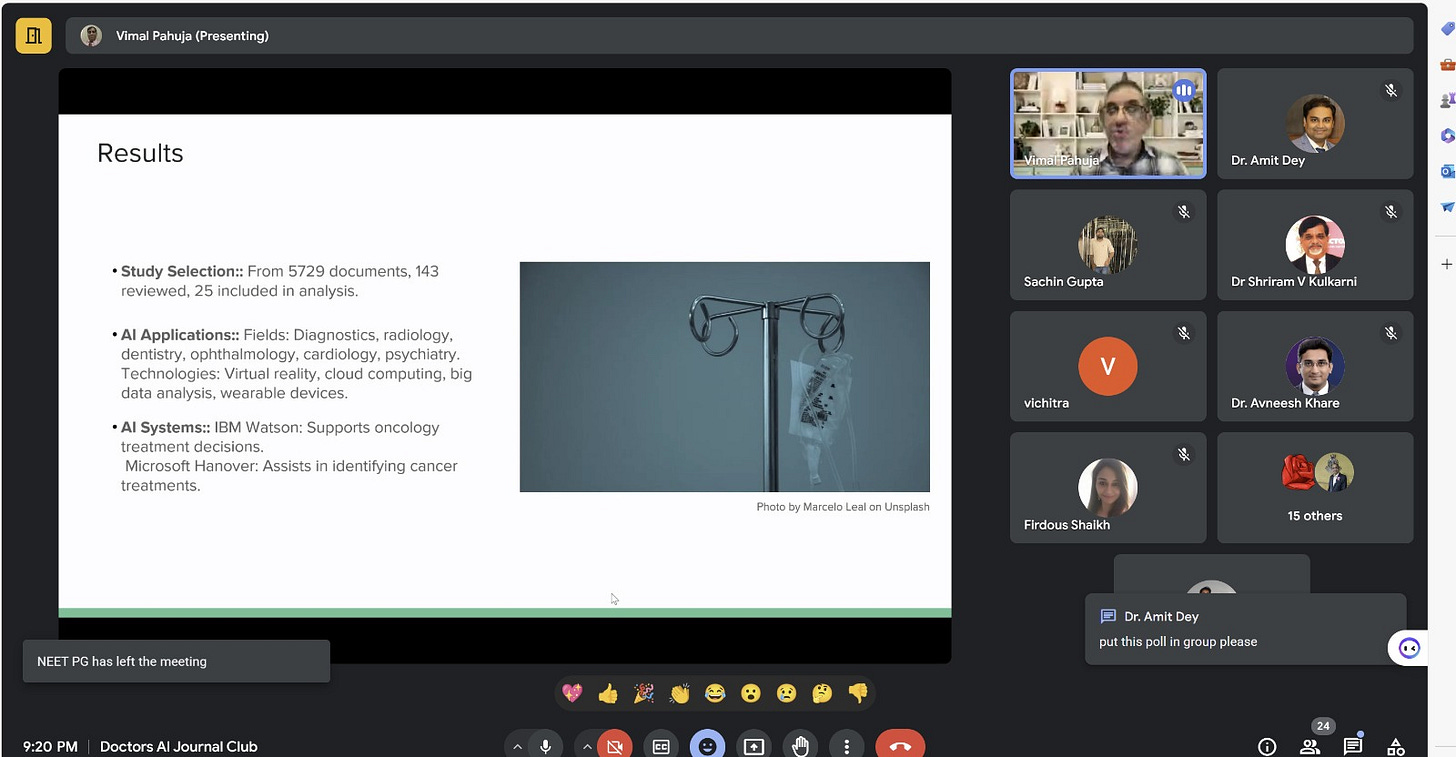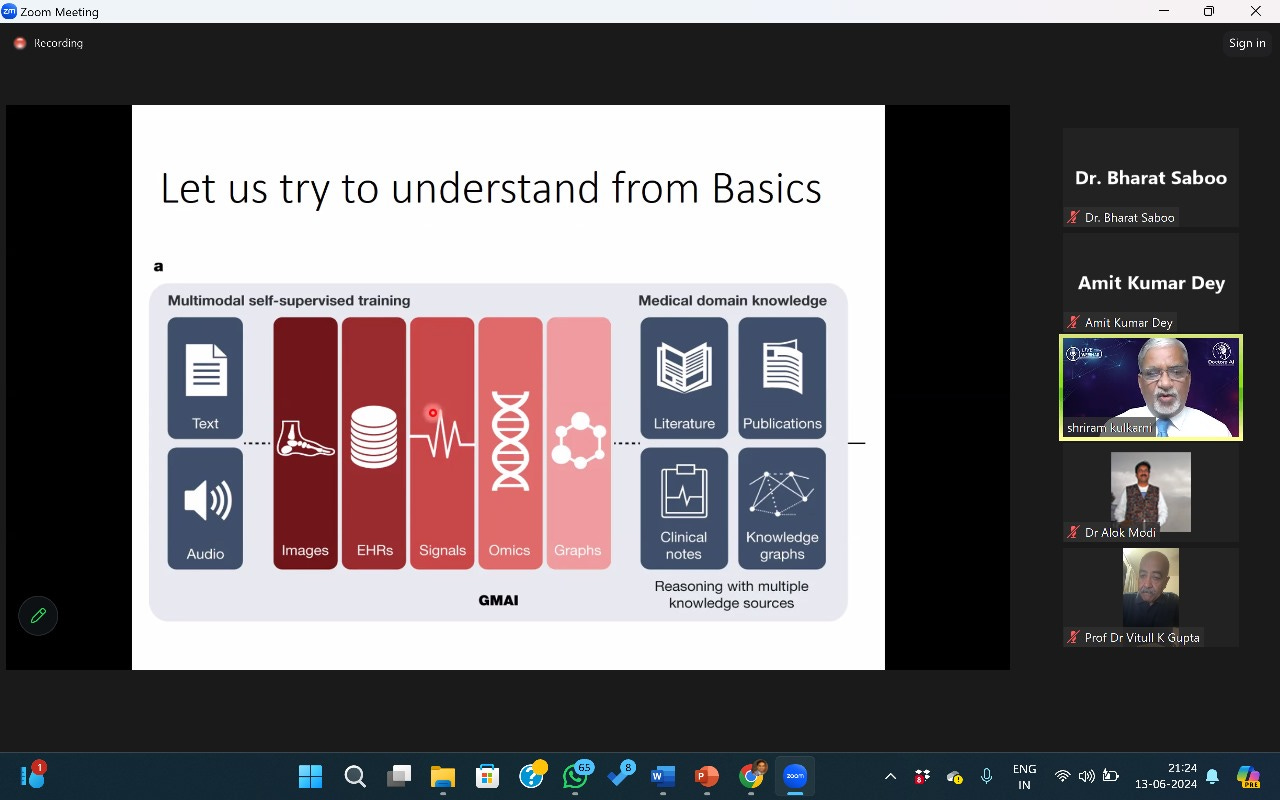June 2024 Edition: AI Workshop 3.0, Major AI Updates, Our New Journal Club, Learning Resources, and More Inside!
Monthly Newsletter of the Doctors AI Community
Welcome to this month’s edition of the Doctors AI Newsletter!
Here, we delve into the exciting world of AI innovations in healthcare. Our community is at the heart of this dynamic field, where cutting-edge technology meets medical expertise.
We’re thrilled to have you with us as we explore these developments together. Join the conversation and discover the future of healthcare, today!
AI Workshop 3.0 (14th July, 2024)
AI Workshop 3.0 is just around the corner on 14th July, and we are geared up to bring an exciting, updated experience to all participants! Limited seats are available for AI Workshop!
In this workshop, we will be covering - Basics of AI/ML and Data Science, Introduction to Orange and Kaggle, Effective use of AI for literature search and writing medical manuscripts, Hands-on use of ChatGPT and Others Gen AI platforms by doctors, Using AI to increase daily productivity and creativity by doctors
This is a foundation course for all medical professionals exploring the use of AI in their daily practice!
Monthly AI Update Hour (20th June 2024)
The conversation highlighted the transformative potential of AI in healthcare, emphasizing collaboration between AI experts and healthcare professionals. Key points included challenges and opportunities in implementing AI. The importance of clean and organized data sets, the challenge of digitizing paper data, and experiences with collecting EMR data were also discussed. Finally, speakers touched on the potential for AI to interpret clinical reasoning and new medical findings.
These were some of the updates shared by Dr Harsh Atul Hirani:
1. AI breakthrough: Speech analysis predicts Alzheimer's progression with 78.5% accuracy
A recent study by Amini et al. (2024) demonstrates that an AI-based speech recognition tool can predict the onset of Alzheimer's disease. Trained on audio recordings from patients with mild cognitive impairment, the model achieved a 78.5% accuracy rate in forecasting whether these patients would remain stable or progress to dementia within six years.
The study, published in Alzheimer’s & Dementia, highlights a novel approach leveraging language models for early detection and progression prediction of Alzheimer's disease.
2. Transforming Breast Cancer Screening: AI Cuts Radiologist Workload by 33% and Enhances Detection Rates
AI-driven mammography has been shown to significantly reduce radiologists' reading workload by 33.5%. It also lowers recall and false-positive rates while improving cancer detection and predictive values, underscoring its effectiveness in breast cancer screening.
3. Unlocking Personalized Therapy for Gestational Diabetes: AI Identifies New Subgroups for Improved Care
A study has identified and validated subgroups of gestational diabetes using data-driven cluster analysis powered by AI. This approach allows for a more nuanced understanding of gestational diabetes, enabling personalized treatment plans and better management of the condition.
4. Pioneering Precision Medicine: How AI is Shaping the Future of GLP-1 Drugs for Weight Loss and Beyond
Advancements in AI and access to diverse data have enabled healthcare providers to predict patient responses to GLP-1 drugs, enhancing personalized treatment plans. This progress unlocks new pleiotropic benefits for various health conditions, leading to more effective and tailored healthcare solutions.
If you missed out on this one, join us for the next AI Update Hour on 18th July, 9 PM to 10 PM IST, to stay at the forefront of AI integration in healthcare. The updates will be presented by Dr Sidharth Narayanan.
Don't miss this opportunity to connect with peers, share insights, and shape the future of medical technology. Mark your calendar and ensure your participation!
International Member Spotlight
Doctors AI Journal Club Is Now Live!
We conducted the first Doctors AI Journal Club on 27th June, 2024. Dr SV Kulkarni acted as expert reviewer, and the session was moderated by Dr Alok Modi.
Dr. Vimal Pahuja presented a systematic review on artificial intelligence (AI) in healthcare and medical education and highlighted the great potential of artificial intelligence (AI) in healthcare and medical education as it can be the source of transformation. AI can improve diagnostic accuracy, personalize treatments, predict outcomes, optimize hospital operations, and increase patient interaction time. In education, AI offers realistic simulations, adaptive learning, and automated test grading.
The benefits include better diagnostics, enriched learning, and workplace efficiency. However, challenges like data privacy, system integration, and bias remain. The authors call for a multidisciplinary approach, proper regulations, and continuously learning AI systems. The review stresses AI's essential role in healthcare advancement and the need for collaborative research.
Dr. Ketan Mehta presented a comprehensive review on the evaluation of sepsis prediction models before treatment onset. The study assessed various models' performance in real-world settings, emphasizing early identification of at-risk patients. Challenges noted include the need for high-quality data and clinical workflow integration.
The research underscores the importance of continuous improvement and validation of these models for reliable clinical use. Using AUROC values and data on antibiotics, fluids, blood cultures, and lactate, the study combined CDC criteria with severe sepsis and septic shock definitions, highlighting the models' potential in early sepsis diagnosis and intervention.
Dr Sachin Gupta presented on a innovative Machine-Learning Based Mobile Platform for Visually Determining the Etiology of 5 Penile Diseases. This AI-driven platform is significant for several reasons. It enables accurate diagnosis in areas lacking medical specialists, reducing healthcare disparities and promoting access. The technology's speed and precision can lead to earlier treatment and better patient outcomes.
Additionally, AI-based diagnosis may be less embarrassing for men, encouraging them to seek care. From a public health perspective, the tool offers cost-effective large-scale disease screening and early detection, reducing financial burdens. It also enhances the training of medical students and professionals through visualizing the diagnostic process. This platform exemplifies AI's revolutionary potential in healthcare, particularly in specialized fields like urology and sexual health, by providing more efficient, accessible, and consistent care.
The next Doctors AI Journal Club is scheduled on 25th July. Stay tuned for topics and speakers - to be announced soon!
Doctors AI Web Hour (13th June, 2024)
This month’s Doctors AI Web Hour featured Dr SV Kulkarni and Dr Kevin Koshy Jacob. The session was moderated by Dr Bharat Saboo.
Dr SV Kulkarni’s talk on AI in Medical Education emphasized that medical education is on the brink of a technological revolution, with a paradigm shift expected in the coming years through advancements like digital cadavers, VR, AR, and MR. AI applications and vast knowledge databases will enable teachers to tailor their educational approaches to individual students, identifying and addressing gaps in knowledge, experience, and practice.
AI tools will ease mundane tasks, saving time and enhancing efficiency. Apps like Gamma and Elicit will assist students in creating presentations and research papers, potentially transforming the quality of medical research. Ethical considerations, such as respecting privacy and avoiding irresponsible data sharing, are crucial. AI-driven teaching technology is poised to become essential for healthcare professionals.
Dr Kevin Koshy Jacob’s talk on Ethics, Governance, and Regulation of AI discussed the rapidly evolving ethical and regulatory landscape of AI, focusing on responsible development, bias mitigation, privacy protection, and human oversight. Key points included the WHO's six ethical principles for AI in health, the European Commission's guidelines on generative AI in research, concerns about AI accuracy, bias, and data quality, and AI's impact on healthcare professionals and patients.
It also covered the regulatory landscape, highlighting India's proposed frameworks for responsible AI and data governance, and global efforts like the EU's AI Act. The conclusion emphasized the need for balancing innovation with ethical considerations and robust governance to ensure trustworthy AI development.
The next Doctors AI Web Hour is scheduled on 11th July. Stay tuned for topics and speakers - to be announced soon!
AI Podcast
In Episode 20 of 'AI for Good' series, Dr. Brynne Archer Sullivan discusses the transformative impact of artificial intelligence (AI) in the Neonatal Intensive Care Unit (NICU). She focusses on the use of AI for predictive analytics to enhance neonatal care, specifically in the detection of neonatal sepsis. Dr. Sullivan's research involves developing early warning systems for infection in pre-term infants using pulse oximetry data and predicting neonatal opioid withdrawal syndrome. She emphasizes the importance of predictive monitoring and the challenges of implementing AI algorithms in healthcare settings, particularly in NICUs.
She also discusses the collaboration between clinicians, data scientists, and engineers in developing AI algorithms and the commercialization and availability of AI technology in NICUs. Ethical considerations, such as ensuring unbiased data and representative patient populations, are also addressed. The conversation highlights the importance of education, collaboration, and continuous evaluation in the implementation of AI in healthcare.
Learning Resources
MLTut recommends seven best AI courses for healthcare - LINK
3 Steps to Unlock the True Potential of AI for Health Leaders by Robbie Hughes, founder and CEO, Lumeon - LINK
📝 Stay Updated and Engaged - To receive tailored updates and opportunities for collaboration, please consider filling out our Community Directory Form. By participating, you'll ensure you're at the forefront of our community initiatives and collaborations. The information shared will help us create more targeted and meaningful connections among our members.
Let’s make a significant impact together in transforming healthcare through AI. Your expertise and engagement are vital to our mission!
If you've found value from this newsletter, please subscribe and share with your colleagues. For more engaging discussions and networking opportunities, join our LinkedIn community and follow our WhatsApp channel.
Together, let's continue to pioneer the integration of medical professionals-led AI into healthcare, shaping a future where technology and human expertise create a healthier world for all!







